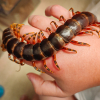I accidentally didn't close the outworld completely because it was so dark in my room. Good thing I checked 15 minutes later and found about 8~ that ran out. I caught most of them. Not many escaped because there was a fluon barrier that was SUPPOSED to stop ALL of the ants but apparently cannot.
My room is messy so finding two of them 5 ft away is A LONG distance for an ant.
So I'm wondering, when the ants escape, how come they run so far off? I would think as an ant, they are colony oriented as in they prioritize the well-being of their colony before their own safety. I would think if they escape, they'd stick close, find a safe place, return and then sneak the Queen out. But in this case, it was less of a "one for all" benefit for the colony and more of a "omgosh, I escaped, F the Queen and this colony, I finally got my freedom so I can stop pretending!!"
Like their escape doesn't feel like it was for the colony, they seem to abandon it all and run off on their own.
I mean, I do notice SOME of the ants kinda stick close but some straight up made a run for it as far as they can.
Or do they just easily get lost a lot?





















